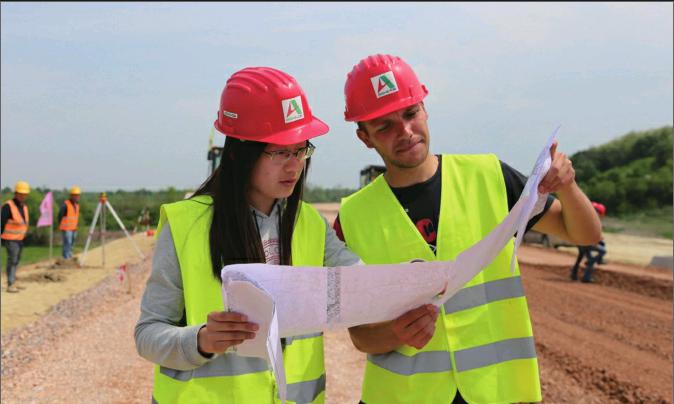ON A DIFFERENT TRACK
2017-10-22ByShenDingli
By+Shen+Dingli

As a main beneficiary of globalization, China has fi rmly committed to furthering its advancement. Beijing has not only strongly supported free trade worldwide, but also advocated various forms of global governance. It is apparent that since 2012, when China convened the 18th National Congress of the Communist Party of China(CPC), the nation has undertaken a straightforward approach to an all-win type of new globalization, often taking a prominent leadership role which shapes an ever-changing global political landscape.
A beneficiary
To begin with, China is a major benefi ciary of globalization. At an earlier stage, when the Peoples Republic of China was contained by the U.S. and its followers, the Peoples Republic of China had little choice but to stay with the socialist camp, with less opportunity to engage with the entire world. Meanwhile, Chinas ideology of anti-imperialism, anticolonialism and anti-hegemony has more or less restrained its outreach to the Western world.
With the introduction of its open-door policy from the late 1970s, China encountered a real chance to embrace globalization. Late Chinese leader Deng Xiaopings visits to Japan in 1978 and to the U.S. in 1979 opened Chinas door to these major industrial powers. Since then, Chinas campaign to send students abroad and invite foreign investment and transfer of technology has paid off well. Chinas effort to widely engage with the world has allowed it to access world markets. The combination of its human resources with foreign capital, technology, markets and management exactly comprises Chinas initial participation in globalization. At that time, China was keen to integrate itself into the existing international system.
A major achievement of its participation in globalization is its application for membership of the World Trade Organization (WTO). It goes without saying that China could automatically enjoy “most favored nation” status accorded by all other members of the WTO once it became a part of this organization. However, China would have to open its own markets reciprocally, which posed a rather serious challenge given its weak competitiveness in nearly all aspects of manufacturing. Despite this, China made a strategic decision to join the WTO. It was determined to open its markets in an incremental way so as to gain access to global markets holistically. This illustrates the strategic wisdom of the Chinese leadership to join the global production chains. In this way, China embarked on a move of no return. It could only succeed by becoming a contributing member of the global institution.endprint
Over time, China has become a main force to further globalization. While it has much benefi ted from globalization, it has also contributed to co-development of the entire world. Chinas inexpensive labor has greatly helped contain global inflation, providing stability for other nations. Chinas pro-development stance has welcomed world-wide investment into this country, assuring wealth expansion opportunities and win-win outcomes for all factors of productivity.
Such a process has been much accelerated lately. Over time, China has become a world leader of free trade. By now, it is one of the top global traders, both in terms of goods or services trade. Chinas gigantic exports continue to contain market inflation, and its massive imports drive job generation and economic vitality in its various trading partners.
A new standard-bearer
Since President Xi Jinping took office five years ago, China has increasingly become interested in improving the present type of globalization. As current global institutions tend to ignore the role of emerging economies, Beijing has aspired to fill the void by rallying the rising economies of Brazil, Russia, India and South Africa to work with China under the BRICS manifesto. Based on the blocs success to date, China has created the BRICS Plus concept to allow more emerging economies to share the vision and mission of the existing BRICS group.
As China has experienced a major transformation of its foreign policy strategy toward a more proactive leadership approach, lately it has been interested in setting up complementary regional development institutions, especially through the Belt and Road Initiative, Asian Infrastructure Investment Bank (AIIB) and New Development Bank. By proposing the initiative, China aspires to promote cross-border infrastructure connectivity step by step.
Based on its own experience and success of infrastructure development, China first proposed the Belt and Road Initiative in 2013 with the initial aim of bridging China and its immediate neighbors. The strategy received nearly instant positive responses from most of Chinas neighbors, as they are all keen to improve their roads, rail, airports, seaports, bridges, tunnels, pipelines and telecommunications. As China possesses a tremendous amount of competence in these areas, it is natural that the nation has been supported to spearhead such an endeavor of regional infrastructure interconnectivity.endprint
A major difference of Chinas leadership in such regional development has been that Beijing cares about equality with its partners. China has put forward its pattern of codevelopment as extensive consultation, joint contribution and shared benefits without strings attached. This compares with the European Recovery Program implemented by the United States following World War II which promoted U.S. leadership with strings attached. The Belt and Road Initiative has been making headway so fast that its geographic coverage has already expanded beyond the Eurasian continent to include Africa. The G20 Summit in Hangzhou last year proposed a global consortium for infrastructure build-up. The UN General Assembly also incorporated the notion of Belt and Road development in one of its resolutions in 2016.
As a part of its contribution to globalization, China has extended its leadership to the financial sector both regionally and globally. On the one hand, Chinas RMB officially became an International Monetary Fund reserve currency on October 1, 2016, allowing it to play an even important role in international finance. On the other hand, China launched the AIIB in 2015 to offer additional financial resources in regional infrastructure development. As Asia has significant need for infrastructure build-up, at an annual level of some $800 billion, Chinas initiative has been extremely popular. Despite former U.S. President Barack Obamas opposition to the idea, most of the United States friends and G7 members have joined the AIIB within a mere two years.
As a contrast, a growing trend of not favoring globalization, to say the least, has emerged in the West. Brexit, which goes against European regional integration, has been such a disturbing event. With the Trump administration coming into power, the U.S. has increasingly opted for à la carte bilateralism or multilateralism under the banner of “America first.” Such a reverse trend of globalization upsets many in the world, as over emphasis of national interests, rather than striking a balance between nationalism and internationalism, could undermine global growth in the long run.
Some old European nations are under pressure from rapid EU expansion. Though such expansion brings into the union more workers and further development space, the free flow of people within the system causes employment pressure on well-established member states. Plus, with the ongoing spread of cross-border terrorism, especially accompanied by the instability in North Africa and West Asia, there is rising concern of terrorist attacks in West Europe.endprint
Such new sources of threats deserve serious responses, but not at the cost of regional integration through reverse-globalization. It is also upsetting that the Trump administration has decided to quit the Paris Climate Change Agreement, changing from “America protecting the environment first” to “America damaging the environment first.” Such a narrow understanding of national interests may bring the U.S. short-term economic gain, but will do so at the cost of long-term damage of the environmental and ecological systems of both the U.S. and the world as a whole.
The retraction from globalization by the U.S. and UK is setting a negative precedent for a sustainable and predictable world. Concurrently, China is changing itself from “environment zero” to “environment hero.” President Xis speech delivered at the Davos Forum has been so reassuring, as he committed China to stay with globalization.
In merely five years, China has transformed itself into a champion of globalization and injected its own style of substance into this historical train. Beijings stress of mutual respect and common development has made a true win-win objective possible. There is reason to expect that the 19th CPC National Congress will set a more solid agenda for China to address global governance through fairness and leadership.endprint
